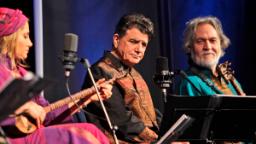
Iran’s legendary classical singer and composer Mohammad-Reza Shajarian dies

“Our nightingale has flown to another tree,” Iranian-American U.S. based musician Farid Shafinury said about Shajarian’s passing in an Instagram post.
Video posted to Twitter shows hundreds of fans gathered in front of Jam Hospital in Tehran where Shajarian was hospitalized earlier this week, defying a partial lockdown order imposed on Tehran after it was reported that Iran had recorded the highest daily coronavirus count since the start of the pandemic.
Many held cellphones over their heads as the crowd sang Shajarian’s songs.
Shajarian’s son Homayoun, also a classical singer, emerged from the hospital Thursday night and addressed fans, saying that his father will be buried next to revered 9th century Persian poet Ferdowsi.
“When they asked me where my father deserved to be buried as a national figure declaring his place in the nation’s history, I said next to Ferdowsi,” Homayoun said.
Iran’s greatest master of traditional Persian music
Regarded as a great ostad — or maestro — of classical Persian music, Shajarian was adored by fans across Iran and around the world.
Born in Mashhad in 1940, Shajarian started singing at the age of five under the supervision of his father, and at the age of 12 began studying traditional classical music styles, according to his official biography.
He launched his musical career as a 19-year-old, performing at Radio Khorasan. By 1960, he had become a prominent figure in classical Persian music in Iran.
Shajarian focused on Persian folk, classical and traditional styles of music, and after college dedicated himself to learning all forms of Persian music, including how to play classical Persian instruments, according to his website.
He received many awards including the UNESCO’s Picasso Medal for outstanding contribution to the arts in 1999; the Chevalier de l’Ordre National du Mérite, the highest distinction in France, in 2014; and the Patron’s Award by the Agha Khan Foundation, in recognition of his enduring contribution to the musical heritage of humanity, in 2019.
“Mohammad-Reza Shajarian sang his last song,” a tweet by the French consulate in Tehran reads. “We will forever regret the melodies of the great master of traditional Iranian song.”
Outspoken and critical against the government
A self-proclaimed humanitarian who openly criticized the Iranian government, Shajarian was a controversial and yet widely loved figure among Iranians. He spent most of his life in Iran and was one of a handful of musicians the Islamic regime allowed to stay and perform in the country after the 1979 revolution.
Nevertheless, both pre-revolution and post-revolution figures expressed their condolences and paid tribute to the legendary singer.
“The unmatched voice of Mohammad-Reza Shajarian as a compassionate member of the Iranian nation and ultimate master of Iranian music will never be forgotten nor silenced,” Iranian Empress Farah Pahlavi said in an audio message posted on her official Instagram page.
Iran’s President Hassan Rouhani tweeted on the passing of Shajarian, saying, “I am certain that the appreciative nation of Iran will keep this popular artist’s name, memory and his work alive in their memories. May his soul rest in peace.”
On Thursday, as the crowds outside of Jam hospital grew in size, people became agitated and started chanting “death to dictator” a phrase that Shajarian was infamously caught on camera saying in 2009 during Iran’s highly contested presidential election.
Homayoun, Shajarian’s son, told the crowd he didn’t want his father’s death to be politicized. He reminded them that his father never allowed political statements to be made during any of his concerts.
“And now please respect my dad,” he said. “Respect for art is bigger than politics.”
Shajarian is survived by his wife, Katayoun, his three daughters Raheleh, Mozhgan, Afsaneh and two sons, Homayoun and Rayan.

















